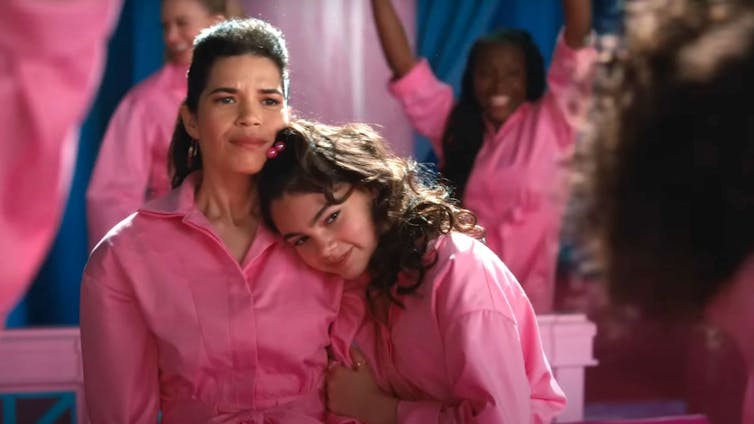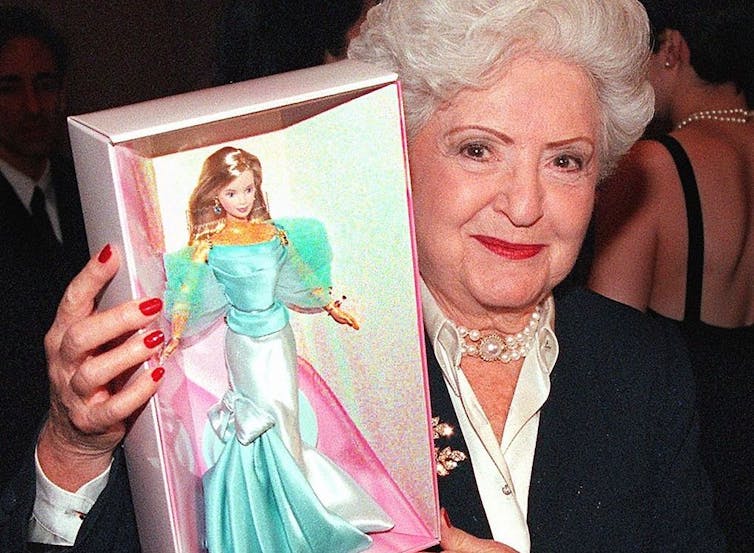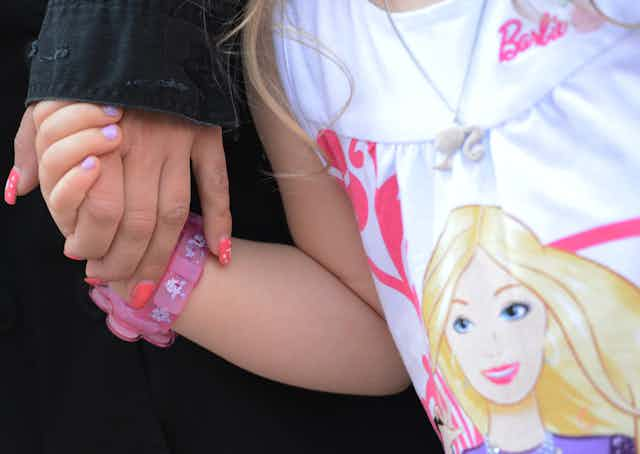Editor’s note: This article contains plot spoilers for “Barbie.”
The wildly popular “Barbie” movie has been touted for its celebration – and critique – of femininity.
As a mother and a media scholar, I couldn’t help but see “Barbie” through an even narrower lens: as a film that, at its core, is about mothers and daughters.
The film’s plot centers on a life-size doll, known as “Stereotypical Barbie,” played by Margot Robbie, who begins to malfunction: Her feet go flat, and she can’t stop thinking about death. So she leaves her perfect plastic life to embark on a quest to restore the boundary between the real world and Barbieland. Along the way, she learns that the real world is nothing like her girl-power wonderland, where Barbies hold all the positions of power and influence and Kens are just accessories.
But its thematic heart rests in the film’s examination of the tensions around being a mother – a role often taken for granted, even as the cultural fantasies of motherhood clash with the actual sacrifices that moms make.
Motherhood as mere drudgery?
I was immediately struck by the movie’s funny but chilling observations about motherhood.
“Since the beginning of time,” unseen narrator Helen Mirren intones sardonically in the film’s first line, “since the first little girl ever existed, there have been dolls.” (Cinephiles will immediately recognize this scene and its setting as an homage to Stanley Kubrick’s famous “dawn of man” opening from “2001: A Space Odyssey.”)
Girls appear on screen, wearing drab, antiquated dresses and playing “house” with their dolls in a primitive setting, expressionless and practically drooping with boredom. The problem with these dolls is that girls “could only ever play at being mothers, which can be fun” – Mirren pauses meaningfully – “for a while.”
Then, she adds, her tone turning cynical, “Ask your mother.”
The appeal of motherhood, Mirren seems to suggest, eventually morphs into unwanted drudgery – a reality underscored moments later when the girls meet their first Barbie, who towers above them, larger than life, inspiring them to smash their mundane baby dolls.
Barbie – a doll of a young, beautiful woman – compels kids to leave the ennui of motherhood behind for the pink plastic sparkle of Barbieland, where all the Barbies live their best lives forever, embodying feminine perfection and possibility.
The framing of motherhood as thankless and undesirable echoes mid-20th-century feminist critiques of child rearing and housework. These roles not only bound women to the home but also forced them to perform repetitive tasks that didn’t reflect their abilities and derailed their ambitions.
In her 1949 book “The Second Sex,” French philosopher Simone de Beauvoir argued that women, to empower themselves, needed to reject the myth that motherhood represented the pinnacle of feminine achievement. American writer Betty Friedan would echo this sentiment in her 1963 book “The Feminine Mystique,” railing against the image of the “happy housewife heroine” who finds fulfillment in being a wife and mother.
It’s no coincidence that these ideas overlapped with the invention of Barbie in 1959. While predating the women’s movement of the 1960s and 1970s, Barbie’s creator, Ruth Handler, did design the toy to allow girls to imagine their future adult selves, rather than simply play-acting as mothers using baby dolls.
The value in ‘motherwork’
And yet, not only do many women enjoy being mothers, but motherhood also plays an essential role in society and life.
In her 1976 book “Of Woman Born,” feminist poet Adrienne Rich draws a distinction between the fulfilling relationship mothers can have with their children and the patriarchal institution of motherhood, which keeps women under men’s control.
Sociologist Patricia Hill Collins coined the term “motherwork” in the mid-1990s to highlight the experiences of women of color and working-class mothers, many of whom don’t have the resources to pursue their own ambitions over caring for their families and communities. When you’re just trying to navigate the day-to-day without wealth or other forms of privilege, options like hiring a nanny or paying for graduate school aren’t feasible or a priority.
For these mothers, the survival of their children is not a given. Instead of tedium and oppression, motherwork acknowledges that mothering can be a radically important labor of love and a source of empowerment in its own right.
In “Barbie,” the mother-daughter relationship between Gloria, played by America Ferrera, and her daughter Sasha, played by Ariana Greenblatt, contains these contradictions.
After experiencing a vision of the person whose sadness seems to be the source of her malfunctions, Stereotypical Barbie initially assumes it’s Sasha’s tween angst that’s disturbed the perfection of Barbieland and drawn her into the real world. Instead, Barbie discovers it’s Gloria’s loneliness – and her nostalgia for a simpler time when she played Barbies with her daughter – that has caused the rift between reality and fantasy.

Sasha and Gloria’s adventure with Barbie – first escaping the Mattel executives who want to lock Barbie in a box and then journeying back to Barbieland to rescue the other Barbies from the Kens, who are trying to take over – repairs the relationship between mother and daughter.
Gloria remembers what it’s like to find joy in motherhood, and Sasha realizes that her mother isn’t just a bland set of values against which to rebel. Gloria is a fully fledged person with a rich inner life who, by her own estimation, is sometimes “weird and dark and crazy,” which Sasha admires.
Sasha – and all the Barbies – have something else to learn from Gloria, too.
Stunned that even someone as perfect as Barbie feels like she’s not good enough, Gloria delivers a poignant monologue encapsulating, in Barbie’s words, “the cognitive dissonance required to be a woman under patriarchy.”
Gloria, as a mom struggling to reconcile her deep love for her child with the fear that she’s constantly failing at motherhood, knows all too well how this cognitive dissonance wears women down.
Letting go
In her 2018 book “Mothers: An Essay on Love and Cruelty,” scholar Jacqueline Rose argues that motherhood is tied to notions of citizenship and nation and, for this reason, can become “the ultimate scapegoat for our personal and political failings.”
The ending to “Barbie” rejects the notion that mothers are to blame for their children’s mistakes. Instead, the film offers another perspective through the character of Ruth Handler, Mattel’s founder, who’s played by Rhea Perlman. Handler helps Barbie see what awaits her if she chooses to become human.
Symbolically letting go of her creation and encouraging her to forge her own path, Ruth tells Barbie that she cannot control her any more than she could control her own daughter, and that mothers should pave the way for their children, not hinder them.
“We mothers,” she explains, “stand still so our daughters can look back to see how far they’ve come.”

This sentimental and self-effacing message seems at odds with the film’s nuanced portrayal of motherhood through humor and critique.
But, throughout, “Barbie” invites viewers to question even its own structure, tenets and messaging – and presents multiple perspectives on motherhood.
Mothering is hard work and sometimes may even be thankless labor. It may bore or disappoint. It can be affirming or heartbreaking or both. It involves leading and following, holding on and letting go.
Being a mother shouldn’t have to be about sacrifice or about fitting some impossible ideal. Instead, motherhood can highlight the possibilities of living in – and with – the contradictions.


